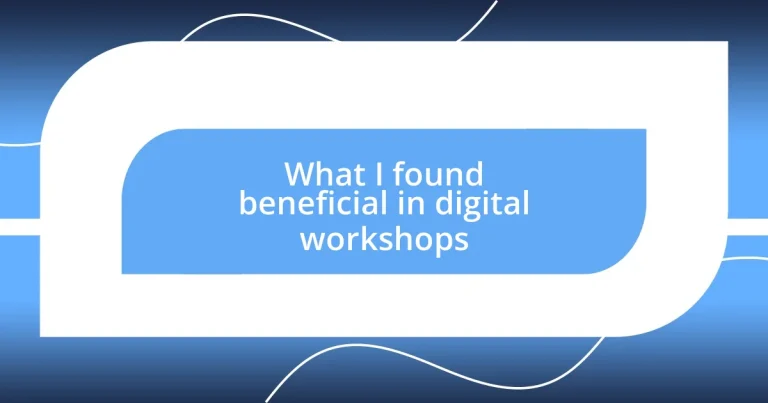Key takeaways:
- Digital workshops enhance accessibility and foster a strong sense of community, allowing participants to connect across geographical barriers.
- Key skills developed include effective communication, technical proficiency, critical thinking, time management, and networking, which significantly aid professional growth.
- Real-world applications of workshop learnings empower participants to implement strategies and gain confidence, demonstrating the practical value of these educational experiences.
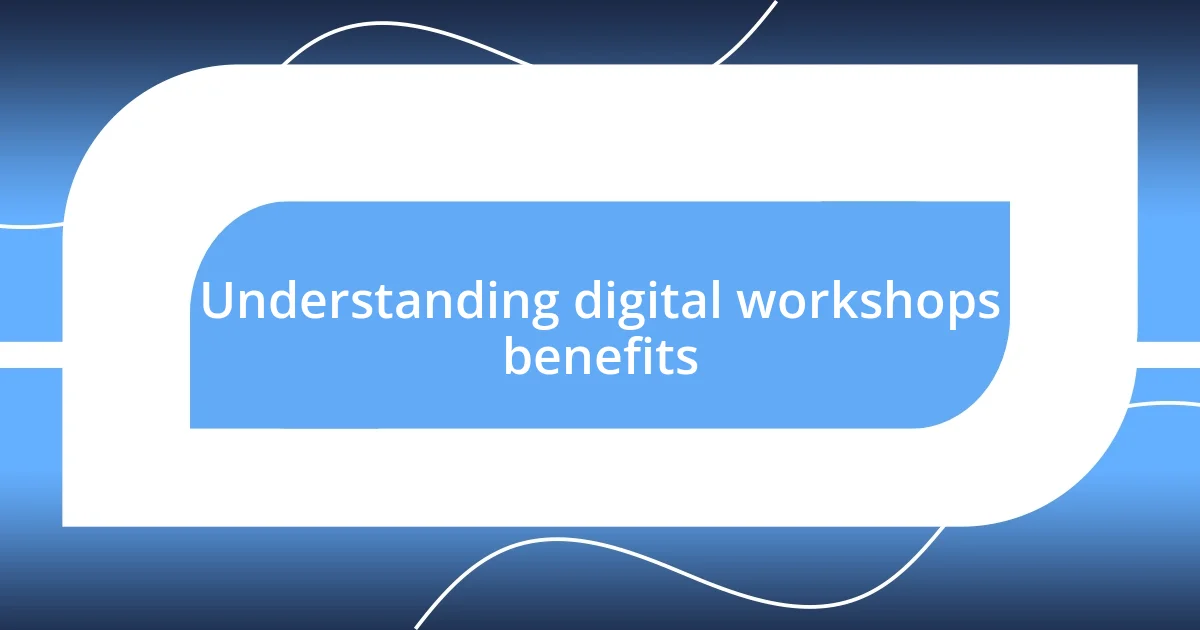
Understanding digital workshops benefits
One of the most striking benefits of digital workshops is the accessibility they offer. I recall attending a workshop last year that I would have never gotten to if it had been held in-person; traveling across town just wasn’t feasible. It felt liberating to connect with experts and peers from all over the world without the stress of logistics. Isn’t it amazing how technology can break down such barriers?
I’ve also found that digital workshops often foster a sense of community that’s surprisingly robust. During a recent session, I was engaging with fellow participants in a breakout room, and we shared not just insights, but personal struggles and support. This camaraderie is a reminder that despite being physically apart, we can still create meaningful connections. Have you ever felt a bond with someone through a screen that left you inspired?
Furthermore, the flexibility of digital workshops truly enhances the learning experience. I remember one workshop where I could pause the recording to digest complicated material at my own pace; this level of control made all the difference for me. Doesn’t that sound appealing? The ability to revisit content helps reinforce learning and allows for deeper understanding.
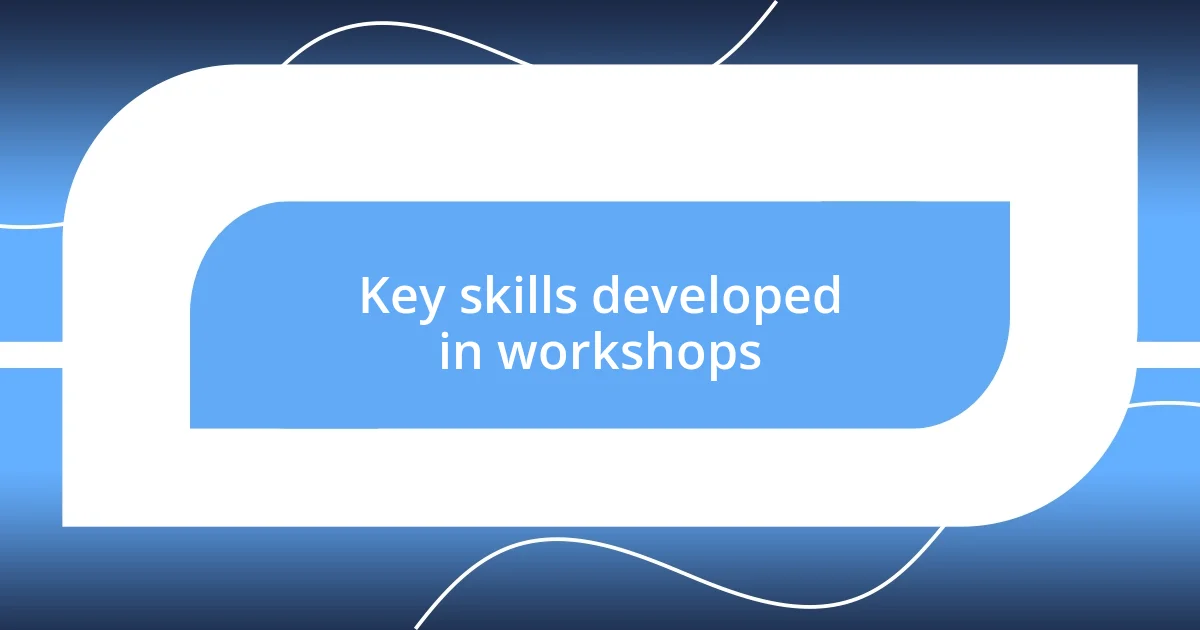
Key skills developed in workshops
Participating in digital workshops has been a transformative journey for me, particularly in honing my communication skills. I vividly remember a workshop where we tackled real-world problems in small groups. As we navigated our differences and perspectives, I found myself thinking on my feet and articulating ideas more clearly than ever before. It was exhilarating to see how effective communication fosters collaboration and leads to innovative solutions.
In addition to communication, technical skills are often enhanced during these workshops. I’ve learned to navigate various digital tools that I never thought I’d use. I’ll never forget the moment I became proficient in a project management software during one session, which has significantly boosted my productivity. Here’s a summary of key skills developed in workshops:
- Effective Communication: Enhance verbal and written skills through collaboration and presentations.
- Technical Proficiency: Gain familiarity with digital tools and platforms that facilitate remote work and learning.
- Critical Thinking: Analyze information and apply it practically to solve problems.
- Time Management: Learn to balance multiple tasks and manage time efficiently in a virtual environment.
- Networking: Build connections with peers and industry experts beyond geographical limitations.
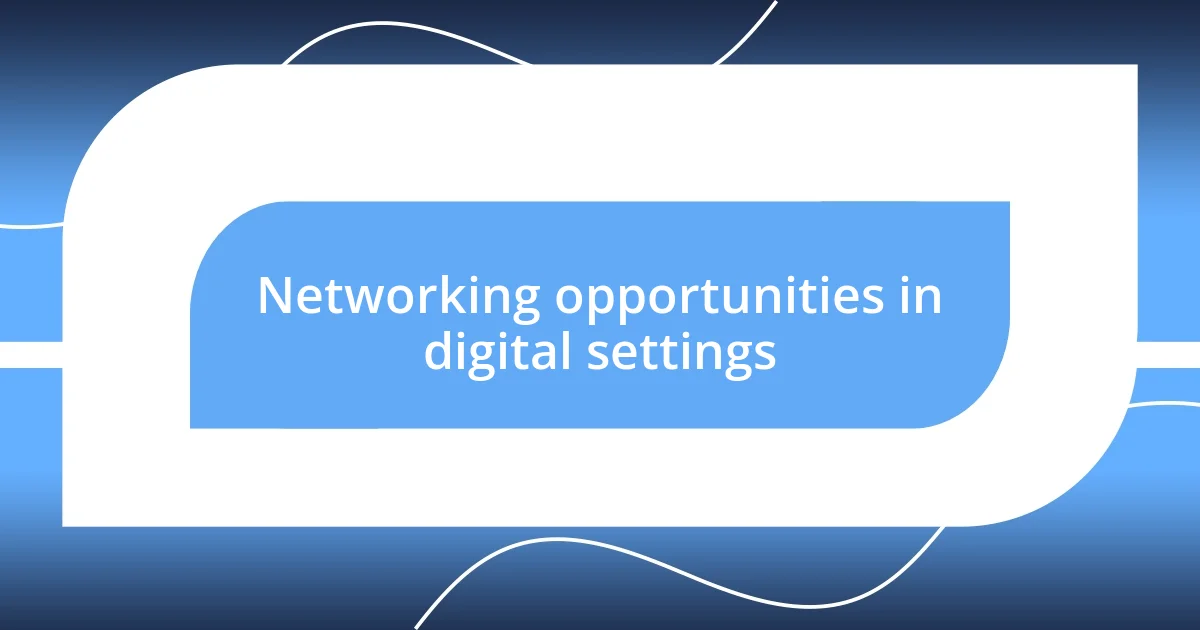
Networking opportunities in digital settings
When it comes to networking opportunities in digital settings, the experience can be both exhilarating and unique. In one recent workshop, I found myself in a virtual chat room where the energy was palpable, despite the screens between us. There was something refreshing about introducing myself to people from diverse backgrounds without the typical barriers of an in-person setting. I remember exchanging LinkedIn profiles with someone who shared my passion for digital marketing, and it felt like the beginning of a fruitful professional relationship. Have you ever felt that initial spark of connection that could lead to something bigger? It’s those moments that make digital workshops invaluable.
On another occasion, the interactive platform allowed us to engage in real-time discussions, instantly nudging us towards forming connections. I vividly recall a mentor figure I met during a workshop focusing on leadership. We ended up discussing strategies for team building, and by the end of the session, I left with not only valuable insights but also a newfound connection with someone I deeply admire. I still catch up with them over coffee—virtually, of course! That kind of networking, fueled by shared learning experiences, can lead to exceptional collaborations down the line.
In addition to the personal connections, digital workshops provide a chance to network globally. It’s intriguing how I’ve connected with people I might never meet otherwise—experts from different countries sharing their unique perspectives. Not long ago, I collaborated with a fellow participant from Australia on a community project that I simply would never have conceived without that workshop. Such opportunities to exchange ideas across borders enrich our understanding and broaden our horizons, don’t you think?
| Aspect | In-Person Networking | Digital Networking |
|---|---|---|
| Accessibility | Location-dependent | Global reach, no travel required |
| Connections | Physical face-to-face | Virtual introductions via chat and video |
| Follow-up | Often requires organized scheduling | Easy through social media and online platforms |
| Engagement | Limited by crowd size | Breakout sessions foster small group discussions |
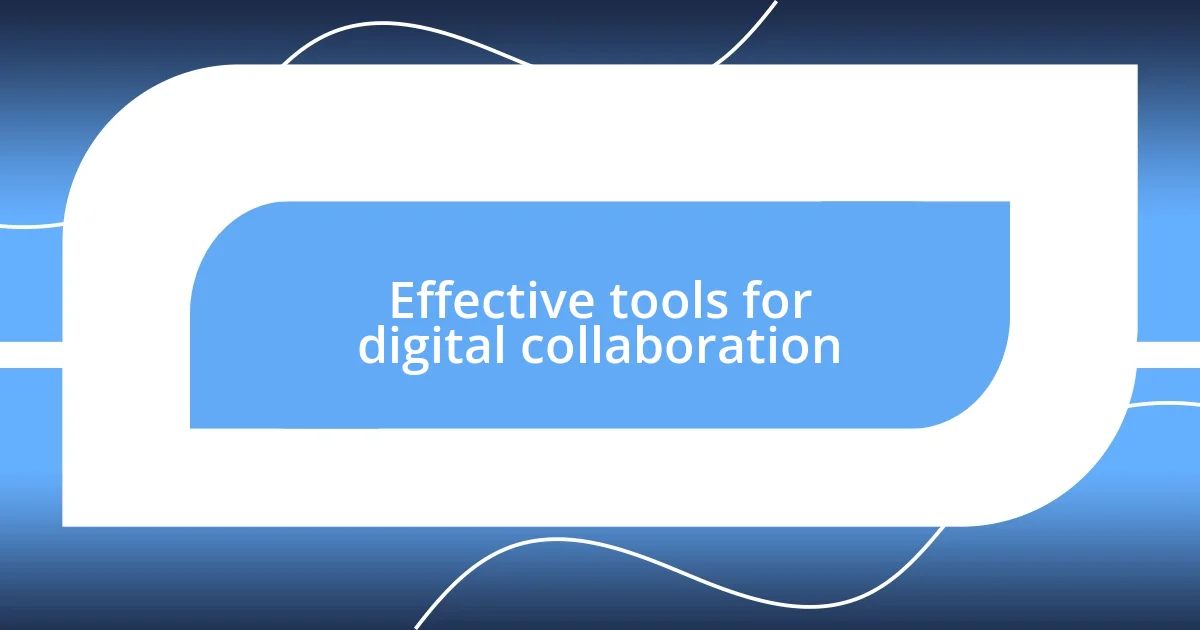
Effective tools for digital collaboration
Effective tools for digital collaboration are essential for smooth interactions in online settings. One tool that has truly transformed my collaborative experiences is Slack. I remember joining a workshop where we utilized Slack to communicate in real-time. This allowed us to share ideas on the fly and keep conversations flowing seamlessly. Have you ever felt time slip away during long email threads? That’s where instant messaging shines, speeding up collaboration and keeping everyone focused.
Beyond Slack, I’ve found Trello to be invaluable for project management. During a team project in one workshop, Trello helped us organize tasks visually. I could see who was responsible for what at a glance, and it made delegating tasks less of a chore and more about ensuring everyone was on the same page. It’s amazing how a simple board can enhance accountability and clarity, right?
Another effective tool I’ve come to appreciate is Zoom for our virtual meetings. It was during a particularly engaging session that I experienced how its breakout rooms promoted deeper connections. Stepping into a smaller group felt like a breath of fresh air, bringing a more intimate atmosphere to discussions. I often wonder how these platforms will continue to evolve in their features to foster even richer collaboration. Isn’t it exciting to think about the future of digital collaboration tools and the potential they hold?
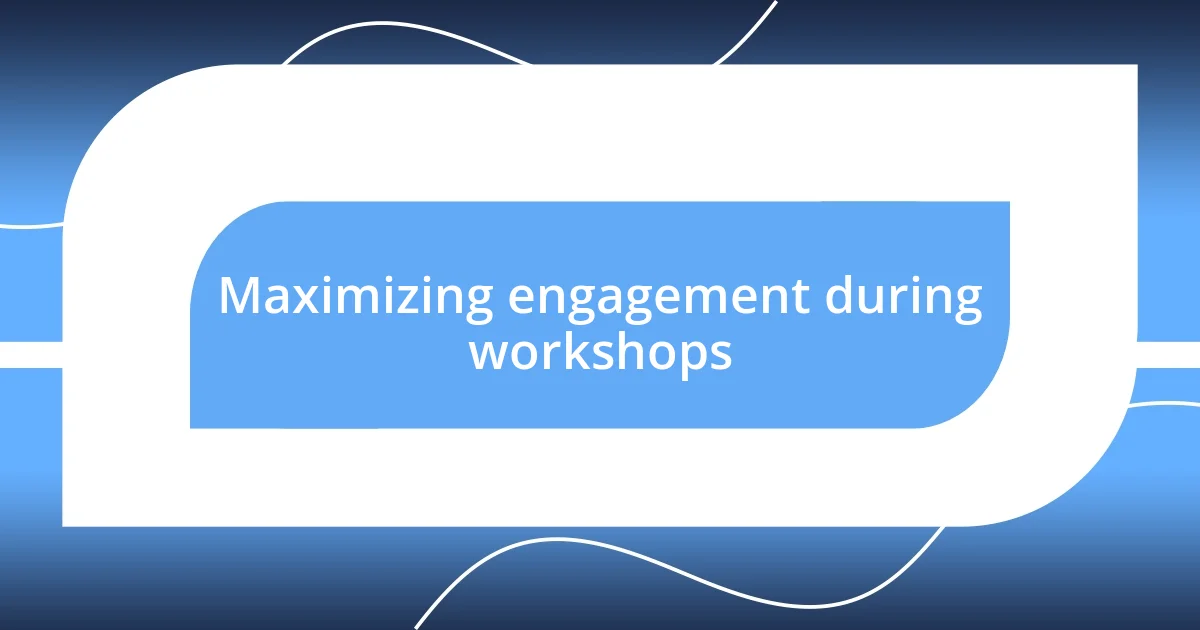
Maximizing engagement during workshops
Maximizing engagement in digital workshops is an art that truly transforms the experience. I remember a workshop where our facilitator skillfully utilized polls and quizzes to keep energy levels high. Suddenly, it felt less like a lecture and more like an interactive game, with everyone actively participating. Have you ever found yourself more engaged when a session feels playful? It’s incredible how those moments can shift the entire atmosphere.
When it comes to fostering discussions, I’ve seen great results by using breakout rooms. During one particularly insightful workshop, we were divided into small groups to brainstorm solutions for common challenges in our industries. That face-to-face interaction, albeit virtual, allowed for more open conversations. I felt comfortable sharing my thoughts and learned so much from others. Isn’t it fascinating how a more intimate setting can draw out the best ideas and creativity in us?
In my experience, incorporating visual elements, like infographics or videos, also plays a key role in maximizing engagement. I recall a session where a dynamic video sparked a lively debate among participants about the future of technology. The powerful visuals kept our attention and ignited our imaginations. Have you noticed how visuals can sometimes convey emotions and ideas better than words? They truly are a game-changer in holding attention and making discussions memorable.
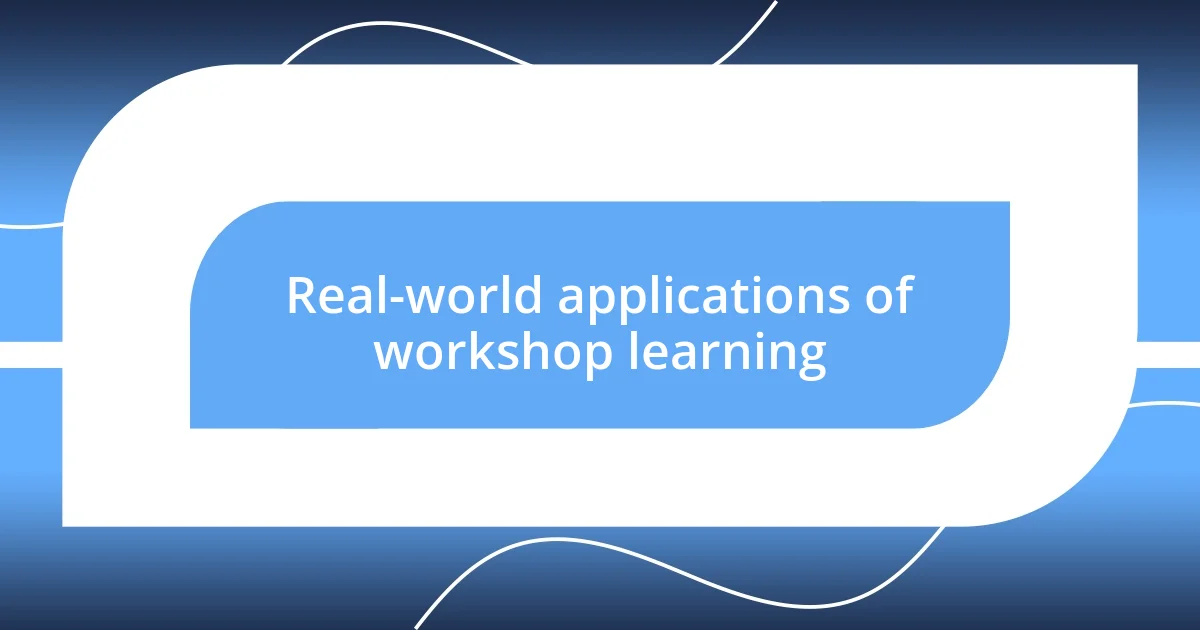
Real-world applications of workshop learning
I’ve found that the real-world applications of what we learn in workshops can be quite profound. For instance, during a workshop on public speaking, I had the chance to practice my pitch in front of peers. Just weeks later, I found myself delivering that very same pitch to a potential client. The confidence I gained from that workshop experience was invaluable, and it illustrated how practice in a supportive environment can translate into real-world success. Have you ever felt that boost when you practice in a safe space?
I also recall a transformative workshop focused on digital marketing strategies. The hands-on activities involved creating a mock campaign, and it was exhilarating to see our ideas come to life. After the workshop, I applied those strategies to my own business and saw an increase in engagement on social media. It becomes evident that the knowledge gained in such workshops isn’t just theoretical but has practical, tangible outcomes. Have you experienced similar shifts after applying what you learned?
Ultimately, these workshops don’t just impart knowledge; they cultivate skills that can be used immediately in our professional lives. I remember the feeling of walking out of a project management workshop equipped with new techniques. Not only did I organize my tasks more efficiently afterward, but I also noticed a significant drop in project-related stress. Can you relate to that sense of empowerment when you leave a workshop ready to take on new challenges? It’s a rewarding experience that truly enhances our professional journeys.
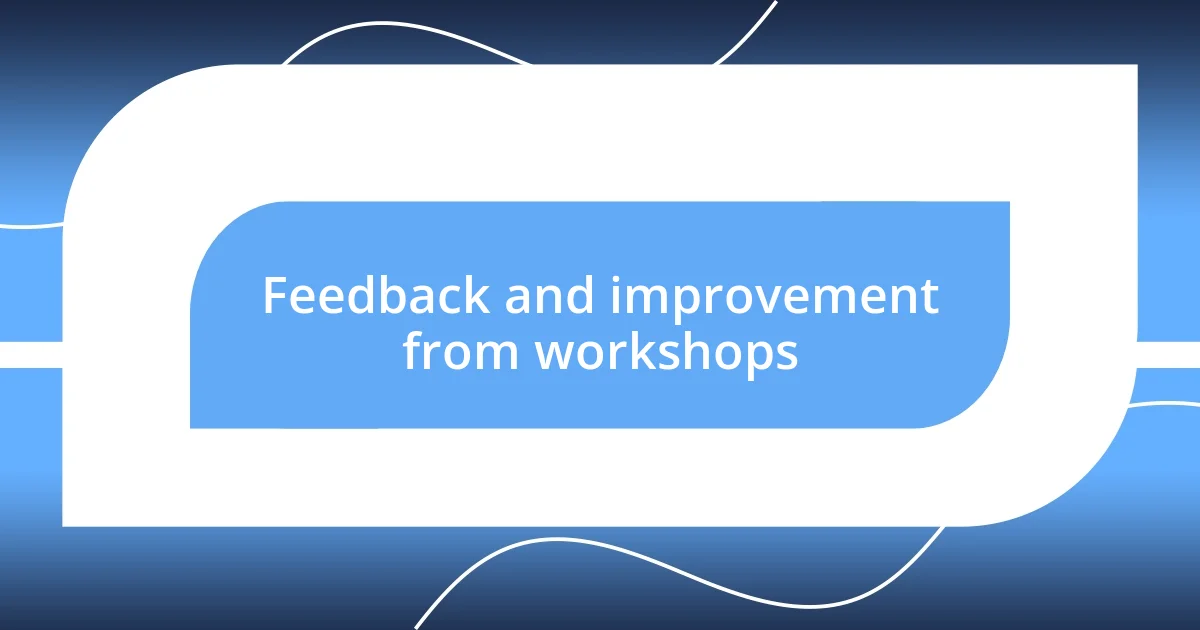
Feedback and improvement from workshops
Feedback is an essential part of the workshop experience, and I’ve learned just how transformative it can be. After participating in a design thinking workshop, we were all invited to provide anonymous feedback on the exercises. I remember feeling nervous at first, but it turned out to be a relief to express my thoughts candidly. The facilitator took that feedback seriously, turning critiques into actionable improvements for future sessions. Have you ever experienced the thrill of knowing your voice made a difference?
Embracing constructive criticism has also allowed me to grow in unexpected ways. During a writing workshop, we exchanged drafts and received detailed reviews from our peers. I distinctly remember my initial hesitation in sharing my work, but the supportive environment made it easier to open up. The insight I gleaned from others’ perspectives helped me refine my style, and I’ve noticed that my writing flows much more smoothly now. Doesn’t it amaze you how fresh eyes can illuminate aspects you might have overlooked?
Moreover, the iteration that comes from feedback is where the magic truly happens. In one workshop focused on leadership skills, we enacted various scenarios and roles, followed by group discussions critiquing our approaches. I can still recall the lightbulb moments when we collectively unpacked a tough decision I had made during the exercise. Those discussions not only challenged me to rethink my style but also ignited a genuine passion for continuous improvement. Have you found that such experiences lead you to embrace learning as a lifelong journey?












